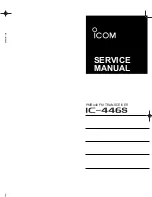
NX-203
11
CIRCUIT DESCRIPTION
1. Overview
The NX-203 is a VHF portable transceiver designed to
operate in the frequency range of 136 to 174MHz. The unit
consists of receiver, transmitter, phase-locked loop (PLL)
frequency synthesizer, base band parts, power supply, and
control circuits.
2. Frequency Confi guration
The receiver is a double-conversion superheterodyne
using the first intermediate frequency (IF) of 58.05MHz
and the second IF of 450kHz. Incoming signals from the
antenna are mixed with the local signal from the PLL circuit
to produce the fi rst IF of 58.05MHz. This is then mixed with
the 57.6MHz second local oscillator output to produce the
450kHz second IF. The transmit signal frequency is gener-
ated by the PLL VCO, and modulated by the signal from the
DSP. It is then amplifi ed and fed to the antenna.
x3
57.6MHz
ANT
SW
RF
AMP
MIX
IF AMP
PLL
VCO
Base band circuit
ANT
TX/RX: 136~174MHz
136~174MHz
MCF
CF
450kHz
58.05MHz
19.2MHz
194.05~232.05MHz
PA
AMP
TX
AMP
VC
TCXO
AF
AMP
MIC
AMP
1st MIX
SP
MIC
Fig. 1 Frequency confi guration
Fig. 2 RF and IF circuit
3. Receiver System
3-1. RF Circuit
An incoming RF signal from the antenna terminal is
passed through the antenna switch (D104, D105, D209 and
D211) and then the bandpass fi lter (L220, L224). The band-
pass fi lter is adjusted by a variable capacitor. The input volt-
age to the variable capacitor is regulated by the voltage out-
put from the D/A converter (IC703). The signal is amplifi ed
by an RF amplifi er (Q204), and passed through the bandpass
fi lter (L210, L215). The resulting signal is applied to the fi rst
mixer (Q203), where it is mixed with the fi rst local oscillator
signal output from the frequency synthesizer to produce the
fi rst IF (58.05MHz).
3-2. IF Circuit
The first IF signal is passed through a four-pole mono-
lithic crystal fi lter (XF200) to reject adjacent channel signals.
The fi ltered fi rst IF signal is amplifi ed by the fi rst IF amplifi er
(Q202) and then applied to the lF system IC (IC202). The IF
system IC provides a second mixer, AGC amplifi er, and RSSI
(Received Signal Strength Indicator).
The second mixer mixes the first IF signal with the
57.6MHz of second local oscillator output and produces the
second IF signal of 450kHz.
The second IF signal is passed through the ceramic fi lter
(CF200) to reject the adjacent channel signal. The filtered
second IF signal is amplifi ed by the AGC amplifi er.
The signal from the AGC amplifi er is input to the ASIC
(IC108) through the ceramic filter (CF201) and operational
amplifi er (IC203).
IC413
INAMT
IC713
(2/2)
IC409
SW
SW
IC202
MIX, AGC
EXAMT
IC704
IC707
IC108
ASIC
IC102
DSP
IC408
IC203
IC412
IC703
AMT
VOL
CF201
BPF
IF AMP
Q202
MCF
XF200
BPF
Q201
2nd OSC
X1
19.2MHz
VC
TCXO
x3
CF200
BPF
INT. SP
EXT. SP
RF AMP
Q204
LPF
ANT
ANT
SW
1st MIX
Q203
L109,L110,
L113
BPF
L210,L215
1st PLL OSC (PLL)
BPF
L220,L224
D104,D105
D209,D211












































